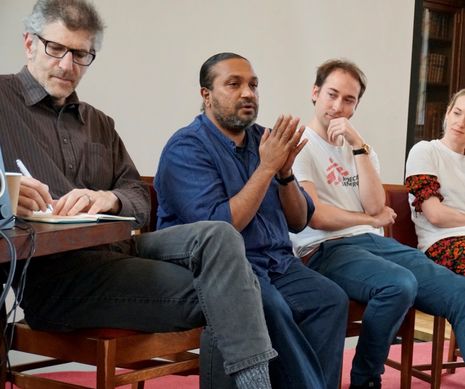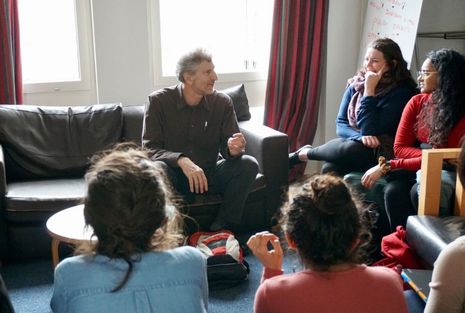Is the humanitarian sector ethical?
Molly Killeen speaks to Marc DuBois about his involvement with Médicins Sans Frontières, and the humanitarian sector’s need for reform
It is in Marc DuBois’ nature, he says, to look at things critically. The field he’s spent his life working in is evidently no exception. After fifteen years at Médicins Sans Frontières (MSF), six of which were spent as director of the UK’s branch, he now works as an independent consultant, runs a blog titled ‘Humanitarian Contrarian’, and publishes articles in which he details what he sees as the fundamental flaws of the humanitarian sector and its practices.
During a day-long conference on ‘the Ethics of Humanitarian Aid’ hosted by the ‘Cambridge Friends of MSF’ society, DuBois joined other practitioners and theorists from the humanitarian sector to discuss the politics and moral complexities of the work undertaken by actors in this area. Founded in 1971, Médicins Sans Frontières, or ‘Doctors Without Borders’, has become one of the cornerstone agencies of the humanitarian aid industry, its primary function being the sending of medical professionals to ‘crisis’ situations around the world, be these conflict zones or the scenes of natural disasters, to provide emergency relief.
DuBois joined MSF as a lawyer, following experiences which he says had already begun to colour his views towards international development. A post-university period in the Peace Corps, a US government volunteer program focused on social and economic development, and an MA in development studies, left him “bogged down in the idea of development”, he says. It seemed to him little more than “taking a group of people and saying, “oh look here’s what you’re supposed to be and it’s external to you…you are defective and need to be corrected”, a view which he notes has now become a “run of the mill” criticism of the international development sector.
Humanitarian aid is 'horribly complex... It isn't simple, that you just "save lives"'
In his role at MSF he shifted to more of a focus on the use of legal rights in the humanitarian arena, but admits an element of naivety in his movement away from development and towards humanitarianism: “I somehow thought, mistakenly, that humanitarian action was more pure…it probably is less complex than development in some ways, politically and ethically, but in the end it’s still horribly complex…It isn’t simple, that you just “save lives.””
Looking back on his fifteen years in the organization, he told Varsity, “I’d say my disillusion grew quite strongly once I was in MSF, especially when I left them and actually had time to reflect on things.” Since leaving his post as MSF-UK director in 2014, he has become increasingly concerned with, and his writing has focused more on, “the underlying structures, the underlying drivers, assumptions, truths, incentives of what we do”, and it is ethics, he says, which provides the way into that discussion.
The last few decades have seen a considerable expansion of what is broadly thought of as the ‘humanitarian sector’, with the notion of “humanitarian intervention” growing in international usage through the 1990s and becoming increasingly entangled with the ever-more networked and multi-layered “development” structures operating across the globe.
The major institutions of humanitarian action, such as the Red Cross and MSF, which predate this period, have been joined by an endless number of smaller agencies competing for funding and access in what has become a competitive field. With these expansions has come what practitioners describe as the “triple nexus”: a convergence of the practices of humanitarianism, development and peacebuilding, and a subject on which DuBois has publicly voiced his opinions.

“People’s needs on the ground aren’t in any way divided according to the sectors by which we as professionals have organized ourselves, that are essentially siloes. The fact that humanitarians, for years, just operated in isolation from development and peacebuilding is in some ways a structural violence that you then perpetrate on people because their needs are completely intermingled.”
This is not to say, he notes, that agencies such as MSF should be engaging in development work. Rather, they have long resisted looking beyond their narrow functions to the broader picture, something which individual organizations can be reluctant to admit they’re failing to do: “There’s a very strong ideology at MSF. It’s very powerful…Internally we don’t see it. Internally we think we fight and we all have diverse opinions but other organizations look at MSF and say “you’re a laser beam” and we never feel that way.”
'The fact that your work is about more immediate lifesaving shouldn’t obscure understanding the much [deeper] and more structural issues first.'
Both the sector and the organizations which populate it, he makes clear throughout our conversation, are dysfunctional, and are often blinded by a focus on distorted notions of ‘effectiveness’, whatever an individual agency takes that to mean. “There’s quite a powerful ideology [within the sector] of saving lives and that heroism of saving lives cancels out a lot…the fact that your work is about more immediate lifesaving shouldn’t obscure in any way understanding the much [deeper] and more structural issues first.”
In both our interview and the discussions throughout the conference, DuBois emphasises the need for an ethics-based consideration of humanitarian actors’ entry into other countries where they may remain, instituting short-term “fixes” over many years, “applying an emergency remedy in perpetuity.”
“Humanitarian intervention and humanitarian action can be very disempowering to communities”, he says, especially in conflict situations, where they can do damage “to the sorts of structures that need to remain in place when peace comes: things like the social contract are not assisted by fifteen years of MSF giving you healthcare.”

The logic of effectiveness which creates these problems is ingrained within the sector’s bureaucracies, he says, where there exists “an ideology that is defined, and a conceptualization of effectiveness that is defined, in such a way that they’re able to say ‘well, we’re more effective than these people so, of course it should be us doing that work.’”
On a broader level, DuBois points out, the practice of such provision at all carries an inherent hypocrisy. Citing failings in the mental health provision and social care in the UK and the US he asks, “would you accept that NGOs come in from other nations and do it for you, displace your efforts and just say ‘get out of the way, this is immoral what you’re doing here, we have a right to give these people care and you’re denying it with crappy policies and practices’? We’d never let that happen.”
In his written work DuBois has criticized the sector’s paternalism and called for a “break from the past, and a reckoning for a sector steeped in its neo-colonial origins”, a theme echoed in the conference’s discussions. With reference to this he contends that the power dynamic at work in much of humanitarian aid’s operation functions essentially by the “partial problematizing of who needs to be saved.” “And”, he adds matter-of-factly, “it’s not us.”
On the prospect of change, DuBois seems reluctant to pin down exactly what form that might take. What is clear, he says, is that it will have to come from outside the field to a certain extent. “People have a right to solve their own problems, and the fact that they can’t solve them as well as we can right now isn’t necessarily a reason why you should be the one to go and do it.”
'People are being abandoned by their governments and they’re able to look at their phones and see that there’s a better life somewhere else in the world.'
“The crisis of immediate needs isn’t going away. People are being abandoned by their governments, fucked over by global empires of businesses and they’re able to look at their cell phones and see that there’s a lot better life somewhere else in the world.”
Through all of this, the need for adaptation is evident, he says, describing the humanitarian sector as “a dinosaur, an anachronism”, but a stubborn one, nonetheless. For it to survive will require modification, but what exactly will kick-start this on a systemic level seems less clear, particularly given the absence of accountability pressures which might otherwise drive it.
“If New Balance makes bad sneakers, you buy Reebok. Humanitarian action is the only thing I can think of where the people who pay for the sneaker don’t really care whether it’s working or not. They care, but they don’t have a connection to it. As long as you can make them believe it’s working, they will feel good about giving money.”
On the drive for “localization” within humanitarianism, or the take-over of what have long been the functions of international aid organizations by their national and regional counterparts, DuBois suggests the idea itself is a misnomer. The problem is that the sector is already overly-localized, he says, but it’s localized in the ‘West’, both in terms of visibility and flows of money. It is perhaps then more a process of “globalization” than “localization” that is needed, he suggests.
“I have some hope that ethics matter”, he adds. In pursuing change practitioners need to “get off of the discussion of outcomes and doing things the right way and get on to the discussion of doing the right things, get out of effectiveness and into what’s right and what are the ethical principles.”
Things will move, he says, but when it comes to institutional adaptation, “the bottom line is this is about power, and the people who have it don’t want to give it up.”
 News / CUP announces funding scheme for under-represented academics19 December 2025
News / CUP announces funding scheme for under-represented academics19 December 2025 News / Cambridge welcomes UK rejoining the Erasmus scheme20 December 2025
News / Cambridge welcomes UK rejoining the Erasmus scheme20 December 2025 News / SU reluctantly registers controversial women’s soc18 December 2025
News / SU reluctantly registers controversial women’s soc18 December 2025 Film & TV / Timothée Chalamet and the era-fication of film marketing21 December 2025
Film & TV / Timothée Chalamet and the era-fication of film marketing21 December 2025 News / News in Brief: humanoid chatbots, holiday specials, and harmonious scholarships21 December 2025
News / News in Brief: humanoid chatbots, holiday specials, and harmonious scholarships21 December 2025









